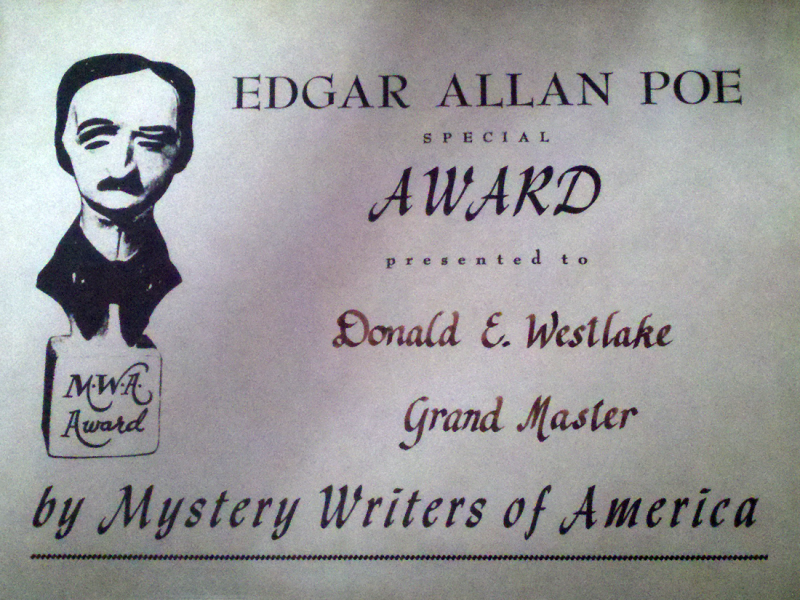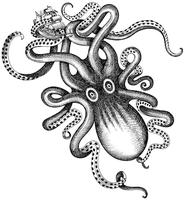
 54th Annual Writers Guild of America East Awards
54th Annual Writers Guild of America East Awards
Ian McClellan Hunter Award for Lifetime Achievement
 “There is a cliché (and clichés usually become clichés because they’re true) that comedians and comic writers are dark, angry, unhappy souls. Donald E. Westlake, who died on New Year’s Eve of a heart attack at age 75, was the funniest mystery writer who ever lived, and nothing about him, or his work, was a cliché. You wanted him at a party because he loved to laugh, just as he loved to make people laugh. He made it clear that he was never the funniest kid in school, but was always the best friend of the funniest kid.”
“There is a cliché (and clichés usually become clichés because they’re true) that comedians and comic writers are dark, angry, unhappy souls. Donald E. Westlake, who died on New Year’s Eve of a heart attack at age 75, was the funniest mystery writer who ever lived, and nothing about him, or his work, was a cliché. You wanted him at a party because he loved to laugh, just as he loved to make people laugh. He made it clear that he was never the funniest kid in school, but was always the best friend of the funniest kid.”
Read more: From Laughter to Tears by Otto Penzler in The Wall St. Journal (2009)
![]() “There can be no question of my doing justice to the writing of Donald Westlake, also known as Richard Stark, Tucker Coe, and other cover names. For background you can go to his fine site or to Wikipedia, or this warm appreciation by Michael Weinreb [see next entry below]. Here I just want to pay brief tribute to a writer who, like Rex Stout and Patricia Highsmith, seemed incapable of composing a bad sentence. Elmore Leonard gets deserved recognition as a laconic master of language, but Westlake was no less skillful. In some ways he was more ambitious and audacious.”
“There can be no question of my doing justice to the writing of Donald Westlake, also known as Richard Stark, Tucker Coe, and other cover names. For background you can go to his fine site or to Wikipedia, or this warm appreciation by Michael Weinreb [see next entry below]. Here I just want to pay brief tribute to a writer who, like Rex Stout and Patricia Highsmith, seemed incapable of composing a bad sentence. Elmore Leonard gets deserved recognition as a laconic master of language, but Westlake was no less skillful. In some ways he was more ambitious and audacious.”
Read more: How to write: Professor Westlake is in, by David Bordwell — David Bordwell’s Website on Cinema (2013)
“When I first came across the fictional antihero known as Parker, he was in a hotel room, torturing a man who had tried to murder him in his sleep. I was browsing a specialty bookstore in Greenwich Village that, like most specialty bookstores, no longer exists; I had, by pure chance, picked up a skinny little volume called The Outfit, which doesn’t so much begin as get straight to the goddamned point. It is no secret that the man who wrote the Parker novels deliberately started many of them with the word “when,” thereby ensuring the rising action would not be muddied up with dull things like exposition; I contend that one of the most direct first sentences in the modern history of the novel details a telephone ringing when Parker is in the garage, murdering a man.”
Read more: The Many Lives of Donald Westlake, by Michael Weinreb – Grantland (2013)
“The Parker novels are but a small part of Donald E. Westlake’s illustrious career. This Grand Master of the Mystery Writers of America penned more than 100 novels and short stories, as well as screenplays. Here’s a look at some of his forays into film.”
Read more: Parker as Parker: The Long Road to the Big Screen, by Valerie Kalfrin – Signature (2013)
Posthumous novels, of course, are not unusual. […] But what about posthumous novels that are neither the last work of a writer recently deceased nor a virtually completed work that, for some reason, wound up in the bottom drawer? Both of the Westlake discoveries are in that category. So two questions arise: Why weren’t they published while Westlake was alive, and would he have been happy to see them published after his death?
Read more: Westlake Lives! Two posthumous gifts from a master entertainer. — The Weekly Standard (2012)
![]()
![]() “Donald E. Westlake was a twentieth-century master of crime fiction. Under the name Richard Stark, one of his many pseudonyms, he penned the legendary Parker novels, including three just brought back into print by the University of Chicago Press this week: Butcher’s Moon (1974), Comeback (1997), and Backflash (1998), each with a new foreword by Westlake’s friend and writing partner Lawrence Block. To celebrate their release, Press publicity manager and Parker masterfan Levi Stahl sat down with Brian Garfield, novelist (author of the cult classics Death Wish and Hopscotch), screenwriter, and an old friend of Westlake’s.”
“Donald E. Westlake was a twentieth-century master of crime fiction. Under the name Richard Stark, one of his many pseudonyms, he penned the legendary Parker novels, including three just brought back into print by the University of Chicago Press this week: Butcher’s Moon (1974), Comeback (1997), and Backflash (1998), each with a new foreword by Westlake’s friend and writing partner Lawrence Block. To celebrate their release, Press publicity manager and Parker masterfan Levi Stahl sat down with Brian Garfield, novelist (author of the cult classics Death Wish and Hopscotch), screenwriter, and an old friend of Westlake’s.”
Read more: Playing Poker with Parker: An Interview with Brian Garfield (2011)
![]() One of the enigmas in the long and rich career of Donald E. Westlake was that this author of more than 100 novels, many of them popular, accessible and plot-driven works of crime fiction, both grim and comic, received such a spotty handling by Hollywood. Roughly two dozen films emerged from Westlake’s novels or involved screenplay work by the man himself. But only two — 1967’s “Point Blank,” based on the first novel he wrote under the pseudonym Richard Stark, and Westlake’s adaptation of Jim Thompson’s “The Grifters” (1990) — are clear standouts. Both films, oddly, were done by British directors (John Boorman and Stephen Frears, respectively) well out of the Hollywood mainstream. “When you read the books, your superficial sense of them is that they’re totally movie-ready,” said Terrence Rafferty, a veteran film critic who’s written for the New Yorker and GQ. But adaptations of Westlake’s work, he said, range mostly from not very good to the “train wreck” that is 2001’s “What’s the Worst That Can Happen?” and the “absolutely dreadful” case of 1974’s “Bank Shot.”
One of the enigmas in the long and rich career of Donald E. Westlake was that this author of more than 100 novels, many of them popular, accessible and plot-driven works of crime fiction, both grim and comic, received such a spotty handling by Hollywood. Roughly two dozen films emerged from Westlake’s novels or involved screenplay work by the man himself. But only two — 1967’s “Point Blank,” based on the first novel he wrote under the pseudonym Richard Stark, and Westlake’s adaptation of Jim Thompson’s “The Grifters” (1990) — are clear standouts. Both films, oddly, were done by British directors (John Boorman and Stephen Frears, respectively) well out of the Hollywood mainstream. “When you read the books, your superficial sense of them is that they’re totally movie-ready,” said Terrence Rafferty, a veteran film critic who’s written for the New Yorker and GQ. But adaptations of Westlake’s work, he said, range mostly from not very good to the “train wreck” that is 2001’s “What’s the Worst That Can Happen?” and the “absolutely dreadful” case of 1974’s “Bank Shot.”
Read more: Hollywood rarely did Donald Westlake justice by Scott Timburg in The L.A. Times (2009)
 Whenever I told Donald E. Westake I wanted to interview him about his complete canon, he just shrugged, not really interested. He loved to talk about anything but his own work (at least with me; maybe with other professionals he talked shop). So I didn’t get to interview him, but there are 92 emails from Don saved on my hard drive. Perhaps I should have conducted my interview as a written questionnaire! He wrote as easily as most of us speak.
Whenever I told Donald E. Westake I wanted to interview him about his complete canon, he just shrugged, not really interested. He loved to talk about anything but his own work (at least with me; maybe with other professionals he talked shop). So I didn’t get to interview him, but there are 92 emails from Don saved on my hard drive. Perhaps I should have conducted my interview as a written questionnaire! He wrote as easily as most of us speak.
Read more: A Storyteller That Got the Details Right, by Ethan Iverson – Do the Math (2010)
 The Black Tentacle, however, is something a little different. It’s an award we created specifically to recognize a novel that doesn’t quite fit the award description but is so exceptional it merits the highest praise. We don’t expect to hand out Black Tentacles every year. Of all the novels we read this year, there was one book that knocked our collective socks off; one book we have ceaselessly recommended; one book we honestly believe every single person who visits this blog should read and own and buy multiple copies of and give away at birthdays and bat mitzvahs and any other day that ends in “-day.” That novel is Memory, by the late, lamented Donald E. Westlake.
The Black Tentacle, however, is something a little different. It’s an award we created specifically to recognize a novel that doesn’t quite fit the award description but is so exceptional it merits the highest praise. We don’t expect to hand out Black Tentacles every year. Of all the novels we read this year, there was one book that knocked our collective socks off; one book we have ceaselessly recommended; one book we honestly believe every single person who visits this blog should read and own and buy multiple copies of and give away at birthdays and bat mitzvahs and any other day that ends in “-day.” That novel is Memory, by the late, lamented Donald E. Westlake.
Read more: The Kitschies: 2010 Black Tentacle Winner – Pornokitsch.com (2010)
 “Westlake’s writing felt like the work of a man half his age, someone still hungry to make it as an author. His storytelling retained its interest right up to the end. Losing James Crumley stung. Losing Gregory Mcdonald was a blow. Losing Westlake? That hurt. Especially since he showed no signs of slowing down in his writing and never lost a step. A rare feat, indeed, dear readers.”
“Westlake’s writing felt like the work of a man half his age, someone still hungry to make it as an author. His storytelling retained its interest right up to the end. Losing James Crumley stung. Losing Gregory Mcdonald was a blow. Losing Westlake? That hurt. Especially since he showed no signs of slowing down in his writing and never lost a step. A rare feat, indeed, dear readers.”
Read more: Nobody Runs Forever: A Last Good-bye to Donald E. Westlake, by Cameron Hughes – The Rap Sheet (2009) [Includes farewell blurbs from many admiring authors.]
Just before Nobel season in 2006, the Los Angeles Times asked several commentators for prize recommendations. I suggested Westlake for literature: “Enough with honoring self-consciously solemn, angst-ridden and pseudo-deep chroniclers of the human condition. Westlake is smart, clever and witty–a prolific craftsman–and deep. But do the Nobel judges have a sense of humor? I doubt it.”
Read more: Donald E. Westlake, 1933 – 2008, by William Kristol — The Weekly Standard (2009)
![]() “Crime fiction lost a don of the genre last week: Donald E Westlake, the author of more than 100 hard-boiled novels and mystery capers, died at the age of 75. Westlake’s legacy is not just a library of pulpy page-turners: he had a hand in a pack of classic crime movies, including Point Blank and The Grifters. Chris Wiegand presents a shot-by-shot guide to the best”
“Crime fiction lost a don of the genre last week: Donald E Westlake, the author of more than 100 hard-boiled novels and mystery capers, died at the age of 75. Westlake’s legacy is not just a library of pulpy page-turners: he had a hand in a pack of classic crime movies, including Point Blank and The Grifters. Chris Wiegand presents a shot-by-shot guide to the best”
See more: Westlake at the Movies – Photo Gallery, The Guardian (2009)
![]() “Donald Westlake started writing crime novels in 1960 and he made his entrance with a bang: his first one, The Mercenaries, was nominated for the Edgar Allan Poe Award from the Mystery Writers of America, and deserved to be. Between then and his death this past New Year’s Eve, he wrote something like 100 more, won the Edgar three times, was named a Grand Master by the MWA, got an Academy Award nomination for his screenplay of The Grifters, and was called “one of the great writers of the 20th century” by Newsweek. Those are the facts of the matter. What they fail to capture is why people loved the man’s books and why they had the impact they did.”
“Donald Westlake started writing crime novels in 1960 and he made his entrance with a bang: his first one, The Mercenaries, was nominated for the Edgar Allan Poe Award from the Mystery Writers of America, and deserved to be. Between then and his death this past New Year’s Eve, he wrote something like 100 more, won the Edgar three times, was named a Grand Master by the MWA, got an Academy Award nomination for his screenplay of The Grifters, and was called “one of the great writers of the 20th century” by Newsweek. Those are the facts of the matter. What they fail to capture is why people loved the man’s books and why they had the impact they did.”
Read more: Bloody and Rare by Charles Ardai in The Guardian (2009)
![]() “Lest one confuse prolific output with mediocrity, think again. Westlake came of age during the heyday of the paperback revolution, when quantity was rewarded at a penny a word by houses looking for lurid tales worthy of the racy cover art. With families to feed and deadlines to meet, there wasn’t time to fuss over the right turn of phrase or elongated story lines — or to thumb a nose at a particular genre. During his six-decade career, Westlake wrote sleazy novels and children’s books, penned Oscar-nominated film scripts like “The Grifters” and epic television flops like “Supertrain,” dabbled in science fiction and even cooked up a biography of Elizabeth Taylor. But his best home was always crime fiction, as seen through the fun-house mirror of works written under his real name and by his darker alter ego, Stark.”
“Lest one confuse prolific output with mediocrity, think again. Westlake came of age during the heyday of the paperback revolution, when quantity was rewarded at a penny a word by houses looking for lurid tales worthy of the racy cover art. With families to feed and deadlines to meet, there wasn’t time to fuss over the right turn of phrase or elongated story lines — or to thumb a nose at a particular genre. During his six-decade career, Westlake wrote sleazy novels and children’s books, penned Oscar-nominated film scripts like “The Grifters” and epic television flops like “Supertrain,” dabbled in science fiction and even cooked up a biography of Elizabeth Taylor. But his best home was always crime fiction, as seen through the fun-house mirror of works written under his real name and by his darker alter ego, Stark.”
Read more: Under any name, Donald Westlake was a grandmaster by Sarah Weinman in The L.A. Times (2009)
 “After watching a bare-chested dentist trekking through the jungle by torchlight to shake a spear at a sunburned accountant in a loincloth, you might think television reality shows were beyond satire. But that would be underestimating the puckish wit of Donald E. Westlake, who died of a heart attack last New Year’s Eve but still leaves us laughing with his final novel, a rollicking crime caper that pulls the pants right off the reality TV industry. ”
“After watching a bare-chested dentist trekking through the jungle by torchlight to shake a spear at a sunburned accountant in a loincloth, you might think television reality shows were beyond satire. But that would be underestimating the puckish wit of Donald E. Westlake, who died of a heart attack last New Year’s Eve but still leaves us laughing with his final novel, a rollicking crime caper that pulls the pants right off the reality TV industry. ”
Read more: NY Times Book Review for Get Real, the last in the Dortmunder Series (2009)
 On October 8th [2004] the Private Eye Writers of America gave me their annual Shamus Award [The Eye, Lifetime Achievement Award] at a dinner in Toronto, in conjunction with this year’s Bouchercon. Airplane schedules defeated my plan to be there to accept the award, but I sent along the following acceptance speech, which was read to the group by Bob Randisi. I was not the only one who was there in spirit only. Max Allan Collins introduced me, but he couldn’t be there either, so his astral spirit introduced my astral spirit, or something like that. Anyway, here’s what he said, and then here’s what I said. ~DEW
On October 8th [2004] the Private Eye Writers of America gave me their annual Shamus Award [The Eye, Lifetime Achievement Award] at a dinner in Toronto, in conjunction with this year’s Bouchercon. Airplane schedules defeated my plan to be there to accept the award, but I sent along the following acceptance speech, which was read to the group by Bob Randisi. I was not the only one who was there in spirit only. Max Allan Collins introduced me, but he couldn’t be there either, so his astral spirit introduced my astral spirit, or something like that. Anyway, here’s what he said, and then here’s what I said. ~DEW
Read more: Don receives “The Eye” for Lifetime Achievement — Private Eye Writers of America (2004)
![]() “Simply the best. One of the most accomplished crime writers ever, and certainly one of the funniest, Donald Edwin Edward Westlake was born in Brooklyn in 1933, and rambled around much of New York state, growing up, or at least that’s his story. He was raised in Yonkers and Albany, and attended college in Plattsburgh (Plattsburgh? That’s uncomfortably close to Montreal!), Troy and Binghamton, and finally Manhattan. “None to much effect,” he hastens to assure us.”
“Simply the best. One of the most accomplished crime writers ever, and certainly one of the funniest, Donald Edwin Edward Westlake was born in Brooklyn in 1933, and rambled around much of New York state, growing up, or at least that’s his story. He was raised in Yonkers and Albany, and attended college in Plattsburgh (Plattsburgh? That’s uncomfortably close to Montreal!), Troy and Binghamton, and finally Manhattan. “None to much effect,” he hastens to assure us.”
Read more: Donald Westlake – The Thrilling Detective
 “When it was discovered that Stephen King had been using the pseudonym Richard Bachman, King turned that story into a novel as well: The Dark Half is about a writer whose pen name is discovered. In that book, Thad Beaumount uses the pen name “George Stark.” Both that name and Richard Bachman are taken from Westlake’s pen name, Richard Stark.”
“When it was discovered that Stephen King had been using the pseudonym Richard Bachman, King turned that story into a novel as well: The Dark Half is about a writer whose pen name is discovered. In that book, Thad Beaumount uses the pen name “George Stark.” Both that name and Richard Bachman are taken from Westlake’s pen name, Richard Stark.”
Read more: IMDB Page








